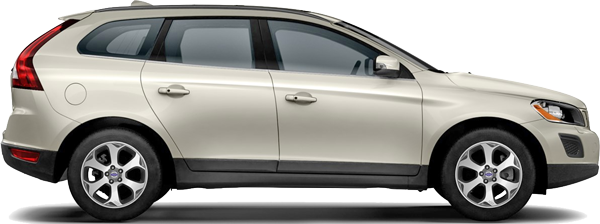The Comparative Analysis :
Volvo XC60 2.0T Powershift Geartronic (10 - 11) vs. Peugeot 4007 HDi FAP 155 DCS (7-seater) (10 - 12)
€ 36,300

€ 36,000

€ 36,300
Base Price ⓘBase price of a new vehicle with standard equipment in Germany at market launch.
€ 36,000
ⓘBase price of a new vehicle with standard equipment in Germany at market launch. Price Info
Vehicle Dimensions
The dimensions of these vehicles differ slightly. The Volvo XC60 2.0T is 0.8 cm shorter, 8.6 cm wider and 4.3 cm taller than the Peugeot 4007 HDi FAP 155.
Volvo XC60 2.0T
Peugeot 4007 HDi FAP 155
1713
1891
2120
1670
1805
2072
1891 mm
Width
1805 mm
2120 mm
Width Incl. Mirrors
2072 mm
1713 mm
Height
1670 mm
2774
4627
2670
4635
4627 mm
Length
4635 mm
2774 mm
Wheelbase
2670 mm
Vehicle Weight
Volvo XC60 2.0T
Peugeot 4007 HDi FAP 155
1833 kg
Kerb Weight
1845 kg
2270 kg
Gross Vehicle
Weight
Weight
2410 kg

Weight Difference:
12 kg
0.65 %

General
Volvo XC60 2.0T
Peugeot 4007 HDi FAP 155
D
Generation
V*
Sport Utility Vehicle
Car Body Style
Sport Utility Vehicle
Unleaded (95 RON)
Fuel Type
Diesel

Front-wheel drive
Drive
On-demand four-wheel drive with engagement by the vehicle's operator

6-speed dual clutch transmission
Transmission
6-speed dual clutch transmission
Engine
Volvo XC60 2.0T
Peugeot 4007 HDi FAP 155
Straight-four petrol engine with turbocharger
Engine Type
Straight-four diesel engine with turbocharger
B4204T6
Engine Code
4HN
4
Valves
4
4
Cylinders
4
1999 CC
Engine Capacity
2179 CC
200 bhp
at 6000 rpm
Power
154 bhp
at 4000 rpm
Volvo XC60 2.0T
200 bhp
154 bhp
Peugeot 4007 HDi FAP 155
300 NM
at 1750 rpm
Max. Torque
380 NM
at 2000 rpm
Volvo XC60 2.0T
300 NM
380 NM
Peugeot 4007 HDi FAP 155
Performance
Volvo XC60 2.0T
Peugeot 4007 HDi FAP 155
127 mph
Maximum Speed
123 mph
8.9 sec
Acceleration 0 to 62 mph
11.1 sec
62 mph
62
mph
mph
124 m
0.000 sec

Volvo XC60 2.0T
62 mph
62
mph
mph
154 m
0.000 sec

Peugeot 4007 HDi FAP 155
▶ REPLAY
9.17 kg/bhp
Weight-to-Power Ratio
11.98 kg/bhp
Volvo XC60 2.0T
9.17 kg/bhp
11.98 kg/bhp
Peugeot 4007 HDi FAP 155
Fuel Economy / Emissions
Volvo XC60 2.0T
Peugeot 4007 HDi FAP 155
Fuel Economy
33 mpg
combined
39 mpg
Volvo XC60 2.0T
33 mpg
39 mpg
Peugeot 4007 HDi FAP 155
25 mpg
city
30 mpg
41 mpg
motorway
47 mpg
70 L
Fuel Tank Capacity
60 L
512 mi
Range
518 mi
Volvo XC60 2.0T
512 mi
518 mi
Peugeot 4007 HDi FAP 155
Environmental Impact
161.1 kWh
Total Energy Consumption
per 100 miles ⓘThe total energy consumption per 100 miles is the amount of energy consumed by a vehicle when burning fuel or using electricity per 100 miles (final energy), and the energy required to produce the appropriate amount of fuel or electricity (primary energy).
per 100 miles ⓘThe total energy consumption per 100 miles is the amount of energy consumed by a vehicle when burning fuel or using electricity per 100 miles (final energy), and the energy required to produce the appropriate amount of fuel or electricity (primary energy).
148.1 kWh
Volvo XC60 2.0T
161.1 kWh
148.1 kWh
Peugeot 4007 HDi FAP 155
Euro 5
Emission Standard
Euro 5
198 g/km (NEFZ)
CO2 Emissions
189 g/km (NEFZ)
Practical Convenience
Volvo XC60 2.0T
Peugeot 4007 HDi FAP 155
5
Doors
5
5
No. of Seats
7
437 kg
Maximum Payload
565 kg
495 L
Boot Capacity
184 L









1455 L
Boot Capacity (Seats Down)
1686 L


















